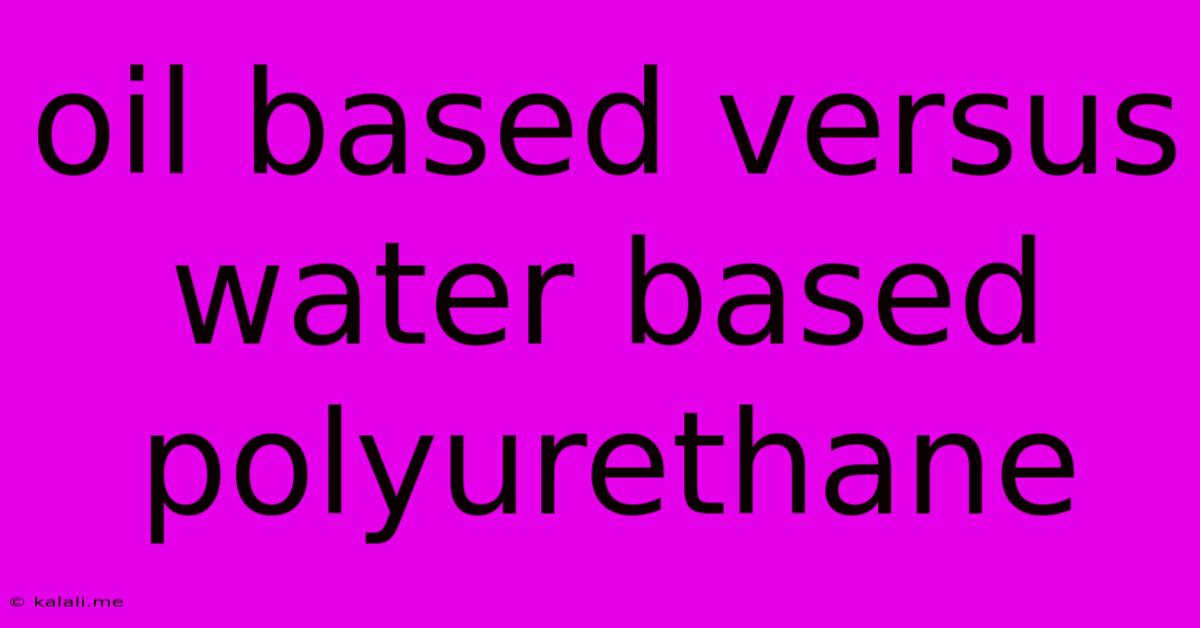Oil Based Versus Water Based Polyurethane
Kalali
May 25, 2025 · 3 min read

Table of Contents
Oil-Based vs. Water-Based Polyurethane: Choosing the Right Finish for Your Project
Choosing the right finish for your woodworking project can feel overwhelming. Two popular choices are oil-based and water-based polyurethane, each with its own set of advantages and disadvantages. This comprehensive guide breaks down the key differences to help you decide which is best for your needs. Understanding the properties of each will ensure a durable and beautiful final product.
What is Polyurethane?
Polyurethane is a durable, protective coating commonly used on wood furniture, floors, and other surfaces. It creates a hard, clear finish that resists scratches, water damage, and wear and tear. The key difference between oil-based and water-based varieties lies in their solvents.
Oil-Based Polyurethane: The Traditional Choice
Oil-based polyurethane has been a woodworking staple for decades. Its reputation is built on its exceptional durability and rich, amber-toned finish.
Pros:
- Exceptional Durability: Offers superior scratch and abrasion resistance, making it ideal for high-traffic areas and furniture that sees frequent use.
- Water Resistance: Provides excellent protection against water damage, although it's not completely waterproof.
- Self-Leveling: Often self-levels beautifully, creating a smooth, even finish with minimal imperfections.
- Excellent for Exterior Applications (when specifically formulated): Certain oil-based polyurethanes are designed for outdoor use, offering superior UV protection.
Cons:
- Strong Odor: Has a strong, pungent odor that requires good ventilation during application and drying.
- Long Drying Time: Dries much slower than water-based polyurethane, often requiring several days between coats.
- Cleanup: Requires mineral spirits or other solvents for cleanup, adding to the environmental impact and cost.
- Yellowing: Over time, oil-based polyurethane can yellow, potentially altering the color of the wood.
Water-Based Polyurethane: The Modern Alternative
Water-based polyurethane has gained popularity due to its ease of use and lower environmental impact. While it might not always match the durability of oil-based options, it offers several significant advantages.
Pros:
- Low Odor: Has a significantly lower odor than oil-based polyurethane, making it suitable for indoor use with less ventilation.
- Fast Drying Time: Dries much faster than oil-based polyurethane, allowing for quicker project completion.
- Easy Cleanup: Cleans up easily with soap and water, reducing environmental impact and simplifying the process.
- Low VOCs: Generally lower in volatile organic compounds (VOCs), making it a more environmentally friendly choice.
Cons:
- Less Durable: Generally less durable than oil-based polyurethane, potentially showing more scratches and wear over time. However, advancements have significantly narrowed this gap.
- Less Water Resistance (in some formulations): While many water-based polyurethanes offer good water resistance, it might not match the protection provided by oil-based alternatives. Always check product specifications.
- Potential for Brush Marks: Can be more susceptible to brush marks if not applied carefully.
- May Raise Grain: Water-based polyurethane can sometimes raise the grain of the wood, requiring additional sanding before subsequent coats.
Choosing the Right Polyurethane: A Decision Matrix
The best choice depends entirely on your project and priorities. Consider the following:
| Feature | Oil-Based Polyurethane | Water-Based Polyurethane |
|---|---|---|
| Durability | High | Moderate to High |
| Drying Time | Slow | Fast |
| Odor | Strong | Low |
| Cleanup | Solvents | Soap and Water |
| Environmental Impact | Higher | Lower |
| Cost | Can be slightly higher | Often slightly lower |
| Yellowing | More prone | Less prone |
Ultimately, both oil-based and water-based polyurethanes offer excellent protection for your woodworking projects. By carefully considering the pros and cons of each, you can make an informed decision that results in a beautiful and long-lasting finish. Remember to always read the manufacturer's instructions for specific application details and drying times.
Latest Posts
Latest Posts
-
400 Ohms Between 5v Positive And 5v Negative
May 26, 2025
-
Why Is My Hot Water Not Working
May 26, 2025
-
Is A High School Diploma A Degree
May 26, 2025
-
Namps Sn Show Mac Address Of Hosts
May 26, 2025
-
If You Want To Go Fast Go Alone Quote
May 26, 2025
Related Post
Thank you for visiting our website which covers about Oil Based Versus Water Based Polyurethane . We hope the information provided has been useful to you. Feel free to contact us if you have any questions or need further assistance. See you next time and don't miss to bookmark.